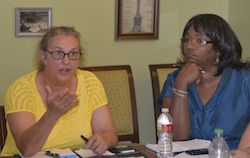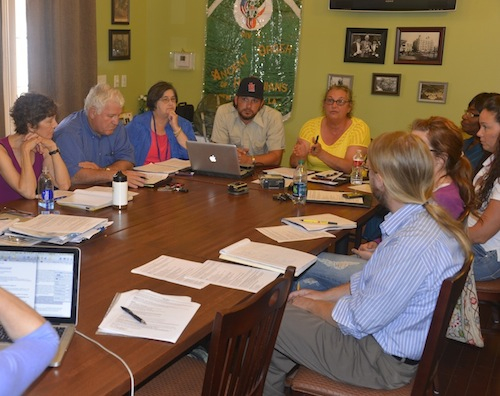Gulf Coast Residents Meet to Establish Regional Citizens’ Advisory Council, Oil Industry Declines to Participate
 By Dr. Bonny Schumaker and Dr. Rick Steiner. Residents from across the Gulf Coast met last week to forge ahead with formal establishment of a Gulf of Mexico Regional Citizens’ Advisory Council (GoM RCAC), whose purpose is to empower and involve citizens in the prevention of and effective response to future pollution incidents occurring from oil and gas operations in the Gulf of Mexico. Based on the highly successful RCAC formed in Prince William Sound, Alaska after the 1989 Exxon Valdez spill (www.pwsrcac.org), the GoM RCAC would be a collaboration among industry, government agencies, and residents, with independent voting representation by major citizen stakeholders across the Gulf Coast – fishermen, tourism operators, women’s organizations, faith-based organizations, indigenous people, local governments, scientists, and environmental groups.
By Dr. Bonny Schumaker and Dr. Rick Steiner. Residents from across the Gulf Coast met last week to forge ahead with formal establishment of a Gulf of Mexico Regional Citizens’ Advisory Council (GoM RCAC), whose purpose is to empower and involve citizens in the prevention of and effective response to future pollution incidents occurring from oil and gas operations in the Gulf of Mexico. Based on the highly successful RCAC formed in Prince William Sound, Alaska after the 1989 Exxon Valdez spill (www.pwsrcac.org), the GoM RCAC would be a collaboration among industry, government agencies, and residents, with independent voting representation by major citizen stakeholders across the Gulf Coast – fishermen, tourism operators, women’s organizations, faith-based organizations, indigenous people, local governments, scientists, and environmental groups.
Both authors of this blog have been involved actively in bringing together the GoM RCAC. Rick is a marine conservationist who helped form the Alaska RCACs after the Exxon Valdez spill in 1989, and Bonny has been monitoring wildlife and pollution in the Gulf with her nonprofit organization On Wings Of Care and other scientists. We both feel strongly that citizens need to play significant roles in keeping oil industry operations in the Gulf as safe as possible.
Photo: Tracy Kuhns and Jackie Washington at the GoM RCAC meeting last week. Photo by J Brayton Matthews, OnWingsOfCare.org.
Soon after citizens called for a GoM RCAC in the summer of 2010, its formation became a key recommendation made in 2011 by the National Commission on the BP Deepwater Horizon Oil Spill and Offshore Drilling. However, Congress has yet to mandate the RCAC, despite requests and petitions from Gulf Coast citizens and multiple organizations. Residents recently decided to take matters into their own hands and have since taken significant steps forward in planning for a GoM RCAC.
“Our goal is to learn from lessons of the past and prepare for the future and to make it safer for those who work, live, and play in the Gulf. We’ll use lessons learned from the BP disaster together with independent science to make sound recommendations to industry and government, and we’ll provide training and equipment for impacted and capable citizens to help protect our lands and waters,” said Drew Landry, a native of Louisiana and one of the coordinators of this meeting.
“The GoM RCAC is not intended to chase RESTORE Act money or to address restoration from impacts of the 2010 Deepwater Horizon disaster,” he added. “The GoM RCAC should not be confused with a ‘Citizens’ Advisory Committee’ that is being formed to help guide restoration of the Gulf.”
The organizers extended invitations to participate in this planning meeting to 16 Gulf of Mexico oil industry operators and representatives, including BP, Shell, ExxonMobil, ConocoPhillips, Chevron, Marine Well Containment Company (which in addition to the above five companies, includes Anadarko, Apache, BHP Billiton, Hess, and Statoil), the American Petroleum Institute (API), U.S. Oil & Gas Association, Texas Oil and Gas Association, Louisiana Mid-Continent Oil & Gas Association (LMOGA), and the Texas Independent Producers & Royalty Organization (TIPRO). Our May 4, 2013 invitation stated the purpose of the meeting as follows:
“To enhance collaboration among industry, government, and citizens that is truly effective for ensuring the safety and sustainability of the Gulf and its resources.”
All industry representatives declined the invitation.
“Ignoring us won’t make us give up. The Gulf Coast needs this citizens’ advisory council. We’ve waited three years for Congress to act on the recommendation from the oil spill commission, and now we’ve decided to act on it ourselves,” explained Alabama resident-representative Jackie Antalan.
 Mississippi resident and fishing community representative Thao Vu (pictured at right) agrees. “Citizens here deserve greater empowerment and a legitimate voice in the safe management of the Gulf oil industry. A regional citizens’ advisory council (RCAC) is a constructive and reasonable way to accomplish this.”
Mississippi resident and fishing community representative Thao Vu (pictured at right) agrees. “Citizens here deserve greater empowerment and a legitimate voice in the safe management of the Gulf oil industry. A regional citizens’ advisory council (RCAC) is a constructive and reasonable way to accomplish this.”
We and the other RCAC organizers hope that industry will follow the recommendation of the National Commission willingly, rather than have it forced on them by Congress. A GoM RCAC is in industry’s interest. A working RCAC benefits everyone -- it lowers the risk of future pollution incidents as well as costly future litigation, it improves future spill responses, and it builds trust and communication with local citizens. But if industry does not follow through, Gulf citizens will press the case in Congress.
We envision the GoM RCAC commissioning research and providing information, recommendations, and assistance to government and industry on all aspects of operations in the Gulf of Mexico, including exploration, production, shipping, storage, transportation, spill prevention and response, and environmental monitoring.
Referring to the highly successful RCACs formed in Alaska after the 1989 Exxon Valdez oil spill, Louisiana resident Kindra Arnesen, whose family and neighbors are fishermen, stated: “We should accept no less than has proven successful in Alaska. We have more industry activity here, and we have more coastline and vulnerable wetlands. Citizens here have enormous resources to offer in order to protect our waters and coastline, and we need to have a say in things.”
The Gulf citizens’ meeting last week was historic, and it’s a real shame the oil industry did not participate. We can’t undo the damage from the Deepwater Horizon, but we can and must do everything possible to prevent and better prepare for future such disasters and other oil impacts. A Gulf of Mexico RCAC is essential for the future of the Gulf.

All photos are from the GoM RCAC meeting last week, and were taken by J Brayton Matthews, OnWingsOfCare.org.
For more information, contact Dr. Bonny Schumaker, GoMRCAC@gmail.com, 626-383-1412
Bonny Schumaker, Ph.D., is retired from 22 years as a scientist at NASA's Jet Propulsion Laboratory. She's also a former Continental Express Airlines pilot and has been an FAA flight instructor for over 15 years. She is Founder and President of On Wings Of Care, a 501(c)(3) charitable organization dedicated to the protection and preservation of wildlife, wild habitat, and natural ecosystems. Combining her skills as pilot and scientist with her passion for wildlife, Dr. Schumaker has clocked nearly 600 hours of flight time over the Gulf of Mexico, documenting the status of wildlife, coastal wetlands, and offshore waters.
Rick Steiner was a marine conservation professor with the University of Alaska from 1980 - 2010, stationed in the Arctic, Prince William Sound, and then Anchorage. He advised the emergency response to the Exxon Valdez oil spill in 1989, and helped form the Alaska RCACs. He has worked globally ever since advising governments, industry, the U.N., and civil society on offshore oil, oil spill prevention, response, damage assessment, and restoration issues.
